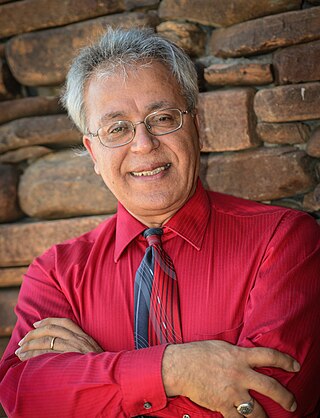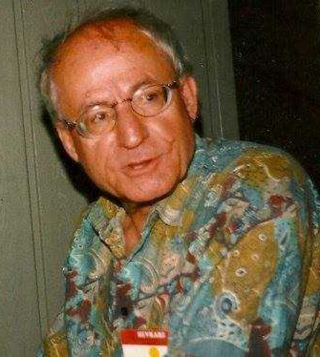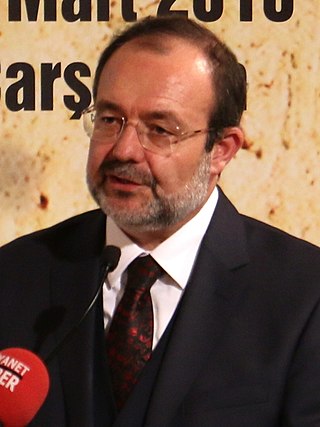
Kurds or Kurdish people are an Iranian ethnic group native to the mountainous region of Kurdistan in Western Asia, which spans southeastern Turkey, northwestern Iran, northern Iraq, and northern Syria. There are exclaves of Kurds in Central Anatolia, Khorasan, and the Caucasus, as well as significant Kurdish diaspora communities in the cities of western Turkey and Western Europe. The Kurdish population is estimated to be between 30 and 45 million.

Kurdish is a language or a group of languages spoken by Kurds in the geo-cultural region of Kurdistan and the Kurdish diaspora. Kurdish constitutes a dialect continuum, belonging to Western Iranian languages in the Indo-European language family. The main three dialects or languages of Kurdish are Northern Kurdish, Central Kurdish, and Southern Kurdish.

Kurdistan, or Greater Kurdistan, is a roughly defined geo-cultural territory in Western Asia wherein the Kurds form a prominent majority population and the Kurdish culture, languages, and national identity have historically been based. Geographically, Kurdistan roughly encompasses the northwestern Zagros and the eastern Taurus mountain ranges.

Adıyaman Province is a province in the Southeastern Anatolia Region of Turkey. The capital is Adıyaman. The province is considered part of Turkish Kurdistan and has a Kurdish majority.
Wheeler McIntosh Thackston is an American Orientalist. He has edited and translated numerous Chaghatai, Arabic, and Persian literary and historical works.

Edip Yüksel is an American-Kurdish activist and prominent figure in the Quranism movement. He is a colleague and friend of the late Rashad Khalifa.

Jamal Nebez was a Kurdish linguist, mathematician, politician, author, translator and writer. He studied Islamic law, philosophy, theology, physics and mathematics at the University of Baghdad in the 1950s. In 1956, he prepared a stenciled script on algebra and in 1960, succeeded in publishing the first physics book in Kurdish, including a rich glossary of Kurdish terms pertaining to physics and mathematics. He translated several literary works, including works of Nikolai Gogol and William Shakespeare into Kurdish. He also wrote and published several books on a variety of topics. Most of the books are mainly about topics related to Kurds.
Michael M. Gunter is a professor of political science at Tennessee Technological University in Cookeville, Tennessee and considered an authority on the Kurds in Turkey, Iraq, Syria, and Iran. Brendan O’Leary referred to Gunter as, "The doyen of Kurdish political studies in the United States,” while Martin van Bruinessen wrote that Gunter is "probably the most prolific of today’s scholars of Kurdish politics.” Gunter has written or edited more than 15 books on the Kurdish struggle and 2 more criticized for promoting Armenian genocide denial. Two of those books on the Kurds were among the first analyses in English in modern times of the Kurdish unrest in the Middle East. In writing his analyses, Gunter has worked directly with top Kurdish and other Middle Eastern political leaders. He received the Kurdish Human Rights Watch's “Service to the Kurds Award” in 1998. "Gunter’s analyses and writings sometimes strike readers as controversial, but he says his views are often based on information that hasn't yet been made public." He has served as the secretary-general of the EU Turkey Civic Commission (EUTCC), an NGO in Brussels that lobbies the EU parliament on behalf of the Kurds since 2009. He is a member of the Board of Advisory Editors of The Middle East Journal, The Journal of South Asian and Middle Eastern Studies, and The International Journal of Turkish Studies, among others.

The Arabic script is the writing system used for Arabic and several other languages of Asia and Africa. It is the second-most widely used writing system in the world by number of countries using it or a script directly derived from it, and the third-most by number of users.

The Sheikh Said rebellion was a Kurdish nationalist rebellion in Turkish Kurdistan in 1925 led by Sheikh Said and with support of the Azadî against the newly-founded Turkish Republic. The rebellion was mostly led by Zaza speakers, but also gained support among some of the neighboring Kurmanji-speaking Kurds in the region.

Martijn Theodoor Houtsma, often referred to as M. Th. Houtsma, was a Dutch orientalist and professor at the University of Utrecht. He was a fellow of the Royal Netherlands Academy of Arts and Sciences, and a leading expert on the history of the Seljuks. He remains best known for his work as editor of the first edition (1913–38) of the standard encyclopedic reference work on Islam, the Encyclopaedia of Islam.
Uğur Ümit Üngör is a Dutch–Turkish academic, historian, sociologist, and professor of Genocide studies, specializing as a scholar and researcher of Holocaust studies and studies on mass violence. He served as Professor of History at the Utrecht University and Professor of Sociology at the NIOD Institute for War, Holocaust and Genocide Studies.

Mehmet Görmez is the former President of the Presidency of Religious Affairs and as such legally the highest level Islamic scholar in Turkey and the Turkish Republic of Northern Cyprus.

Anti-Kurdish sentiment, also known as anti-Kurdism or Kurdophobia, is hostility, fear, intolerance or racism against the Kurdish people, Kurdistan, Kurdish culture, or Kurdish languages. A person who holds such positions is sometimes referred to as a "Kurdophobe".
Mustafa Zalmi was a Kurdish professor and expert in Islamic studies and Sharia law. Zalmi was born in 1924 in the village of Zalm in Hawraman in Sulaymaniyah province in Iraqi Kurdistan. He began to study in local religious schools in 1934 and has studied in both Iraq and Iran. He has finished his religious studies in 1946 in Koya city. Zalmi has received many significant certificates and awards throughout his life for his significant contributions to the Islamic and Sharia law. He is the author of more than 50 books many of which are being studied as the major curriculum in many universities in Iraq, Jordan, Indonesia, and Yemen. Zalmi has earned three master's degrees and three PhD's in Islamic studies and Sharia law. Zalmi has received more than 65 local and international awards in Muslim countries and his work on the interpretation of the Islamic and Sharia law are studied in Kurdistan, Iraq, Jordan, Turkey and Malaysia.
Jasser Auda is a scholar and distinguished professor of Islamic law, in particular, the study of the higher purposes or maqasid of the Sharia. He is the President of Maqasid Institute Global, which is a think tank registered in the United States, United Kingdom, Malaysia and Indonesia, and has educational and research programs in a number of countries.
Güneş Murat Tezcür, a Professor of Political Science, is the Director of School of Politics, Security, and International Affairs at the University of Central Florida (UCF). He received his Ph.D. from the University of Michigan in 2005 and holds the Jalal Talabani Endowed Chair at UCF. He also established The Kurdish Political Studies Program at UCF, the first and only academic entity in North America dedicated to the study of Kurdish issues, in 2015. His research revolves around Middle East politics with a specific focus on political violence, Islamic politics, and democratization in Iran and Turkey. He has also extensively published on the Kurdish question. Tezcür is also the editor of The Oxford Handbook of Turkish Politics and Kurds and Yezidis in the Middle East: Shifting Identities, Borders, and the Experience of Minority Communities.
The denial of Kurds was the official state policy of Turkey for several decades, which denied that Kurds constitute an own ethnic group and alleged that they instead are a subgroup of Turks and the words 'Kurd' and 'Kurdistan' were omitted by state institutions.
Philip G. Kreyenbroek is a Dutch academic specialising in Iranian studies. Throughout his career, he has published several books and articles on the Zoroastrian, Kurdish, and Yazidi traditions.
Kurdish-Islamic nationalism, also known as Kurdish-Islamic synthesis, is a form of Kurdish nationalism which is Islamist instead of secular like the main Kurdish nationalism.










